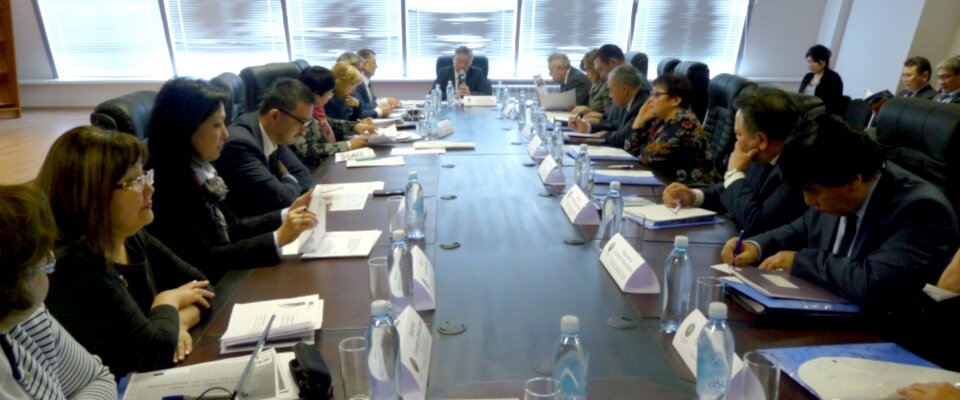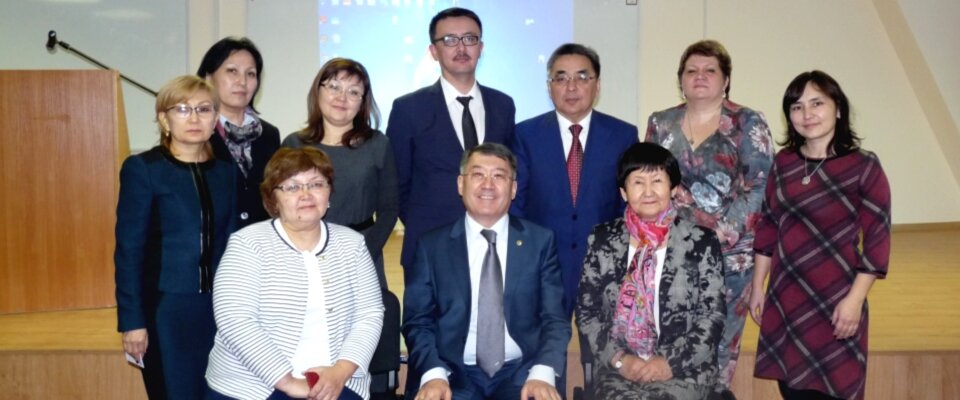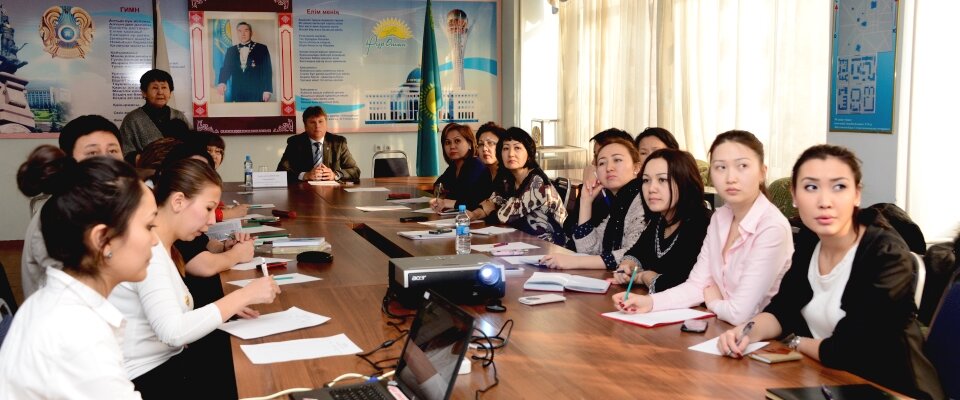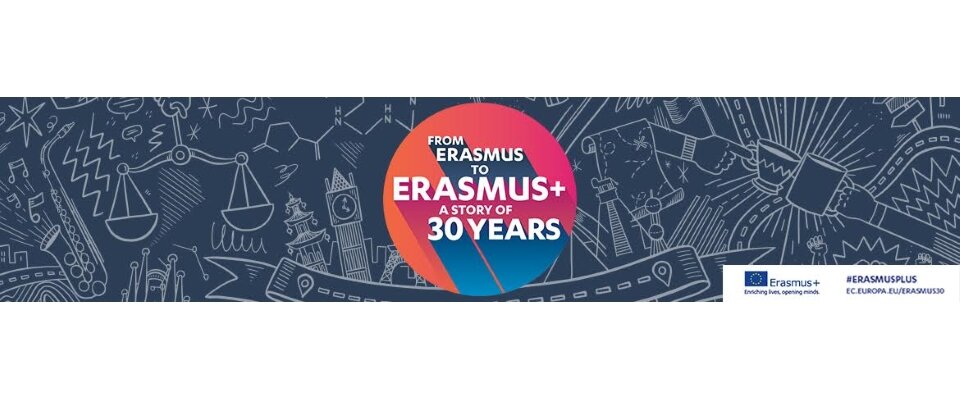|
Composition of the National Team of Higher Education Reforms Experts (HEREs): |
|
|
|
Serik OMIRBAYEV Specialisation - Higher education governance at the national level. ECTS. E-mail: This email address is being protected from spambots. You need JavaScript enabled to view it.
|
 |
Chair – Madina ALIYAROVA Specialisation – practice-based learning E-mail: This email address is being protected from spambots. You need JavaScript enabled to view it.
|
|
|
Banu NARBEKOVA Specialisation – National and Sectoral Qualifications Frameworks, Professional Standards. E-mail: This email address is being protected from spambots. You need JavaScript enabled to view it.
|
 |
Amantay NURMAGAMBETOV Specialisation – University Governance. E-mail: This email address is being protected from spambots. You need JavaScript enabled to view it.
|
 |
Darkhan AKHMED-ZAKI Specialisation – Academic Policy. E-mail: This email address is being protected from spambots. You need JavaScript enabled to view it.
|
 |
Berik AKHMETOV Specialisation - National Qualifications Framework, Educational Programmes Design. E-mail: This email address is being protected from spambots. You need JavaScript enabled to view it.
|
 |
Serik SVYATOV Specialisation – Strategic planning. E-mail: This email address is being protected from spambots. You need JavaScript enabled to view it.
|
|
|
Marina SKIBA Specialisation – External Quality Assurance. E-mail: This email address is being protected from spambots. You need JavaScript enabled to view it.
|
|
|
Miras DAULENOV Specialisation – Internal Quality Assurance. E-mail: This email address is being protected from spambots. You need JavaScript enabled to view it.
|
|
|
Sulushash KERIMKULOVA Specialisation – Management of Educational Process: Content and Technology. E-mail: This email address is being protected from spambots. You need JavaScript enabled to view it.
|
 |
Kymbat KABDULLINA Specialisation – Student Support, Students in University Governance. E-mail: This email address is being protected from spambots. You need JavaScript enabled to view it.
|
Tempus Projects Monitoring
The Tempus Unit at EACEA has established a field monitoring strategy targeting Tempus IV projects. The aim of the strategy is to increase the number of field monitoring visits and to make them more effective, so that projects receive better advice and support on the ground.
The Tempus programme uses three standard forms of monitoring:
1) Desk monitoring by project officers in EACEA in Brussels, by reading project reports and corresponding with beneficiaries on a daily basis
2) Field monitoring by National Tempus Offices and EACEA staff to visit the project in-country. There are three types of field monitoring, each with different aims;
 Preventive field monitoring takes place at the early stages of the project. It aims to provide information on the rules and procedures and reviews objectives, priorities, methodology and activities planned.
Preventive field monitoring takes place at the early stages of the project. It aims to provide information on the rules and procedures and reviews objectives, priorities, methodology and activities planned.
 Advisory field monitoring usually takes place mid-way through the project and aims to make useful recommendations on both the content and the financial aspects of the project.
Advisory field monitoring usually takes place mid-way through the project and aims to make useful recommendations on both the content and the financial aspects of the project.
 Control field monitoring usually takes place after the end of the project and aims to make an assessment of the project's impact and the sustainability of results.
Control field monitoring usually takes place after the end of the project and aims to make an assessment of the project's impact and the sustainability of results.
3) External Results - Oriented-Monitoring (ROM)
ROM monitors are external field monitors contracted by DG Development and Co-operation (DEVCO), to monitor Tempus projects on their behalf. They schedule visits in coordination with EACEA.
Please find more about Monitoring at the eacea website: http://eacea.ec.europa.eu/tempus/beneficiaries/beneficiaries_tempus4_en.php
You can also see the List of sample questions for discussion during the monitoring visit , and the Monitoring Visit Provisional Programme .
The national team of Higher Education Reform Experts (HEREs) in Kazakhstan HEREs Mission:
In collaboration with the Ministry of Education and Science of the Republic of Kazakhstan to support the modernization of higher education in the country taking account of the Bologna process principles.

The HERE team is composed of professionals with extensive experience in the field of higher education at different levels - rectors, vice-rectors, heads of departments, heads of divisions and departments. Extensive experience and knowledge of experts, their openness and willingness to cooperate ensures the demand for their services by the academic community. Most of the experts are members of the Working Groups of the Bologna Process and Academic Mobility Centre, the Independent Agency of Accreditation and Rankings, and other national organizations. Four experts are permanent members of the Working Group on the development of important strategic documents of the Ministry of Education and Science of the Republic of Kazakhstan. HEREs are represented as speakers and moderators of sessions at various national and international events.
The team is implementing their tasks for several years starting since 2008. Initially, HEREs studied and summarized the international experience in reforming higher education, building and strengthening their capacity. Significant work on capacity building and retraining of managers and teaching staff of higher education institutions (HEIs) has been carried out during this period by HEREs, including two Summer (Almaty and Karagandy) and Winter (Semey) Schools, more than 20 regional training seminars (Astana, Kostanay, Kokshetau, Shymkent, Atyrau, Aktau, Uralsk, Petropavlovsk, Aktobe, Zhezkazgan, Taraz).
Topics of these events have been created taking account of the interests and needs of higher education institutions - Strategic Planning in Universities, Development of Educational Programmes based on Competencies, Academic Mobility, ECTS, Qualifications Frameworks, the Diploma Supplement, E-Learning, Student-Centred Learning and others. More than 3,000 teachers and administrative staff from 50 universities representing 14 regions of Kazakhstan attended them.
HEREs submitted project proposals to the Ministry of Education and Science of the Republic of Kazakhstan on the Kazakhstan Qualifications Framework and Guidelines for Registration and Issuance of Kazakhstan Supplement to the European Diploma. HEREs activity also includes analysis and publications on current topics of the higher education development in Kazakhstan. Among them are ‘Reforming higher education in Kazakhstan and the Bologna Process: Information Materials for Practical Actions’, ‘Integration of Higher Education of Kazakhstan into the International Educational Area: Achievements, Problems and Prospects of Development’, ‘Some Conditions for the Integration of Higher Education of Kazakhstan into the Bologna Process: Structure, Content, Science, Human Resources’, ‘Higher Education of Kazakhstan's Integration into the Bologna Process: Management, Content, Human Resources’, ‘Higher Education of Kazakhstan in the Context of the Bologna Process’, ‘The implementation of the Bologna process of Kazakhstan: the Modernization Approaches in the Context of Current Trends’. The texts can be found at the website erasmusplus.kz in ‘Publications’ section.
The team is expanding its media presence, covering transformation in the higher education system in the country in the media and social networks. On request of universities, experts are carrying out face-to-face and remote consultations for their peers from other universities. A separate HEREs page on the NEO website also allows easier access to information and makes advisory services of experts more user-friendly.
Much attention is paid to improving the qualifications of the experts. On behalf of and with the support of the EACEA the European Universities Association jointly with the University of Barcelona organizes regular training events in Europe, as well as targeted Technical Assistance Missions (TAM) in the Partner Countries. In the framework of the TAM in 2016, the team prepared and conducted 5 seminars with the participation of well-known European experts.
Knowledge of European languages, constant creative search, focus on innovations and innovative approach allows the HEREs to be at the forefront in identifying ways to develop the higher education system of the country.




























